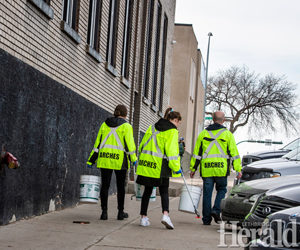City SCS may face more problems than other Alberta sites: report
By Lethbridge Herald on March 5, 2020.
 ARCHES employees pick up debris outside of the city's supervised consumption site Thursday after the provincial supervised consumption services review committee released its report earlier in the day. Herald photo by Ian Martens @IMartensHerald
ARCHES employees pick up debris outside of the city's supervised consumption site Thursday after the provincial supervised consumption services review committee released its report earlier in the day. Herald photo by Ian Martens @IMartensHeraldTim Kalinowski
Lethbridge Herald
tkalinowski@lethbridgeherald.com
The Supervised Consumption Site (SCS) Review Committee report released on Thursday paints a scathing picture of many in the community’s views on the supervised consumption site in Lethbridge, but also draws conclusions which some state are one-sided and purely anecdotal.
According to the report, the SCS Review Committee found “based on multiple comments from stakeholders, it was the committee’s impression that the Lethbridge SCS site may be facing the most problems in the province, since the expressed concerns were disproportionately higher than expressed at other sites.”
These concerns included the cost of providing the service in Lethbridge being much higher than other jurisdictions, reports of increased criminal activity around the site and a testy relationship between SCS staff and local law enforcement.
The report also chronicles many of the same concerns local community members have expressed to City officials and local media in the past, including concerns about needle debris, heightened concerns about public safety due to the SCS and increased social disorder in the downtown because of the SCS.
The report also states ARCHES appears to have a contentious relationship with many in the community and it questions ARCHES’ reporting practices and its response to the general criminality increasing in the area around the SCS.
Coun. Blaine Hyggen welcomed the report, which truly expressed, in his opinion, the central social and economic concerns of many local community members to the provincial government.
“I have really advocated for this — to make sure we have a review from citizens that have concerns,” he said. “There is businesses out there, there’s citizens, and we just haven’t addressed that, I don’t believe. Communities have spoken, not only ours, to the concerns that they have.”
Hyggen said he hoped the report would help improve and better target the provincial response to the local drug crisis, and meaningfully address the social issues which have arisen since the SCS opened in Lethbridge.
“I have said numerous times, I have never advocated for closing the site down,” he told reporters on Thursday. “I have always spoken to the way it is run. Again, not the individuals working there because we have gone through that before, but it’s more of how it is operated, and that was my frustration. Do we need that as a pillar? Supervised consumption? Yes, we do. It’s just how is that going to be delivered is what I am hoping to hear from (the province). Another thing I am hoping to hear is the needles will not leave the site so we not have to deal with all this needle debris.”
Mayor Chris Spearman acknowledged the mixed reaction the community would likely have to the report.
“The supervised consumption site here, and its operation, has always been the responsibility of the province,” stated Spearman. “And we as city council, like other residents in the community, have been awaiting the results of the review. This report will be happily received by some in our community, and equally the news will be received with disappointment by others. Regardless of which camp residents find themselves in, we all need to find the common thread, which remains the need for more supports for those battling substance abuse in our community.”
Spearman said the City would work with the province in whatever way it chooses to go on the local SCS, but he hoped what ultimately comes out of those provincial discussions will lead to better things for Lethbridge which, until recently, lacked almost all the pillars it needed to deal with the drug crisis.
“There needs to be harm reduction,” Spearman stated. “And we need to figure out what that looks like. One of the things I am concerned about is the barriers to access to some of our treatment facilities. You have to be clean for three weeks. Are people going to get into that facility? How do we ensure people are more successful at accessing treatment and recovery? If the supervised consumption site is shut down what then happens with needle debris and needle distribution? Will there be more of that? And will it be throughout the city? I think we have to have considered responses, and we need to make sure whatever the solutions are we end up with a net benefit and a net positive impact on the community in the city.”
ARCHES executive director Stacey Bourque felt the report showed only one half of the picture in Lethbridge regarding supervised consumption services.
“There were no considerations on the merits of supervised consumption services,” she stated, “particularly since the report’s focus was on economic and social impacts of SCS based on people’s perceptions, and anecdotal information they have received. It definitely makes it very difficult, especially when reading through it, when most of the information doesn’t align with reality or the practices that we have in place.”
The Supervised Consumption Site Review Committee co-chair Rod Knecht acknowledged the report did not deal with the harm-reduction side of things when asked by a reporter, who attended the Lethbridge SCS Committee sessions back in September, why positive opinions on harm reduction put forth by several participants weren’t referenced in the report’s ultimate findings?
“When people are using the site itself, they are being supervised, they’re tended to, their street wounds are being looked after,” Knecht acknowledged. “If they have serious medical issues, or other medical issues, those are being addressed in some way, shape or form. And specific to needle debris, of course those people that are injecting in the supervised consumption sites those needles are being disposed of in a safe and healthy manner within the site itself. I guess what happens is, what we determined is, a lot of folks aren’t using the supervised consumption sites. Or folks are using the supervised consumption sites sporadically.”
“The challenge is getting more people using the sites,” he added, “but clearly that’s where the debris issue came in, and the rise in debris, as a consequence of people not using the supervised consumption site.”
The province has stated it will take the report’s findings and conduct a city-by-city examination of supervised consumption sites to come up with what it feels is the best local system to deal with the drug crisis, which may or may not include supervised consumption services going forward.
Follow @TimKalHerald on Twitter
-1




